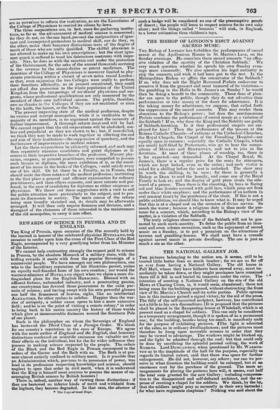REWARDS OF SCIENCE IN PRUSSIA AND IN ENGLAND.
THE King of Prussia, upon occasion of the fete recently held by the learned in honour of the celebrated physician HUFELAND, took occasion to confer upon him the cross of the First Class of the Red Eagle, accompanied by a very gratifying letter from his Minister of the Interior.
We cannot help contrasting strongly the respect paid to science in Prussia, by the absolute Monarch of a military state, with the trifling rewards it meets with from the popular Sovereign of a commercial people. We have amongst our own philosophers, one who to the hereditary reputation of his illustrious parent, unites an equally well-founded fame of his own creation; nor would the warmest admirers of HUFELAND object when we claim a more dis- tinguished place for the English HERSCHEL. Blessed with an affluent fortune, unbounded industry, and a penetrating genius, our countryman has devoted those possessions to the calm pur- suits of science; and having swept with his own powerful glasses one half the firmament of heaven, sighs, like an intellectual ALEXANDER, for other realms to subdue. Happier than the war- rior of antiquity, a nobler cause opens to him a more extensive field ; and he is on the point of visiting a remote colony,* in order to bring back to his native country the history of those worlds which glow at immeasurable distances around the Southern Pole of our planet. Such is the philosopher on whom the Sovereign of England has bestowed the Third Class of a Foreign Order. We blush for our country's reputation in the eyes of Europe. We agree with the acute author of England and the English, that honorary distinctions conferred on scientific eminence are valuable not for their effects on the individual, but for the far wider influence they possess in making science respected by the people. The orders of the Black and the Red Eagle in Prussia correspond to the orders of the Garter and the Bath with us. The Bath is at pre- sent almost entirely confined to military merit. Is it possible that an Administration which, previous to its possession of power, was loud in its professions respecting knowledge and science, should neglect to open that order to civil merit, when it is understood that the King is himself most anxious to possess the means of en- couraging British science by British honours ? There is, indeed, another way of viewing these distinctions: if they are bestowed on inferior kinds of merit and withheld from the highest, they become degraded. In that case, the absence of • The Cape of Good Hope. such a badge will be considered as one of the presumptive proofs of desert ; the people will learn to respect science for its own sake alone; and the things called " honours " will sink, in England, to a lower estimation than children's toys.


















 Previous page
Previous page